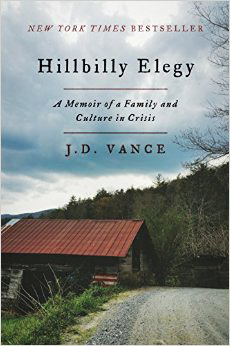
c/o amazon.com
Contrary to many hopes, the 2016 election was not decided by women, immigrants, or people of color. Instead, it was the white working class’s record turnout in states such as Pennsylvania, Ohio, Michigan, Wisconsin, and Iowa that carried Donald Trump to victory. These blue-collar workers, isolated by globalization and modernization and alienated by Democratic identity politics and GOP corporatism, cast their vote for Trump in what The New York Times called a “repudiation of the establishment.”
In the weeks since the election, blue-collar whites have achieved a near-mythical status in the eyes of the mainstream media and Democratic elite. J. D. Vance’s “Hillbilly Elegy,” published in June, is a timely examination of the white working class that trades condescension for sympathy. Vance’s memoir is the story of his own unlikely ascension from a broken home in Middletown, Ohio to a successful career as a lawyer. Along the way, Vance examines the institutions that failed him and debates the role of individual ambition versus societal influence as the cause of white American stagnancy.
Vance is the great-grandson of Mamaw and Papaw Blanton, two legendary figures of Breathitt County, Kentucky. Shortly after World War II, Mamaw Blanton’s teenage daughter, also referred to as Mamaw, became pregnant with Vance’s aunt and fled with her boyfriend from the hills of Kentucky to the booming steel town of Middletown, Ohio. Her husband soon got a job at Armco, now AK Steel Holding, and the two began a seemingly middle class life. Mamaw and Papaw were not unique: During the years after WWII, an informal “hillbilly highway” carried thousands of Appalachian farmers from land of their Scots-Irish ancestors to industrial towns in the Midwest.
Though raised in Ohio, Vance endured an Appalachian legacy of violence and instability. His upbringing was one of constant upheaval. His mother, struggling with drug addiction and mental illness, cycled through numerous short-lived relationships and marriages, and his biological father, a devout Evangelical Christian, remained distant. Only while living with Mamaw in his last years of high school did Vance find enough stability to envision a future beyond the confines of Middletown.
Although Vance’s life story is captivating, buoyed by characters like the gun-toting, fiercely loyal Mamaw, “Hillbilly Elegy” is at its best when the author broadly examines the culture and society of white, post-industrial America. Vance’s portrait of Middletown is bleak, marked by economic decline, social decay, and, most of all, personal hopelessness.
“Years of decline in the blue-collar economy manifested themselves in the material prospects of Middletown’s residents,” Vance explains. “The Great Recession, and the not-so-great recovery that followed, had hastened Middletown’s downward trajectory. But there was something almost spiritual about the cynicism of the community at large, something that went much deeper than a short-term recession.”
Though understanding of the broader economic trends responsible for much of white America’s suffering, Vance can be sharply critical of his community. Working at a supermarket as a teenager, for example, the author is frustrated by welfare recipients wasting government money on T-bone steaks. Vance describes acquaintances who quit their well-paying jobs only to complain on Facebook about the “Obama economy.”
Although it would be easy for Vance to fill his book with this type of finger-wagging, the author opts for a more nuanced view. Due to factors beyond their control, Vance argues, members of his community feel powerless and become content with stagnation. The author, speaking from experience, proposes that his community needs positive role models to demonstrate that their choices actually matter. Vance credits his own success to the time and effort of others. When the author describes how he avoided the fate of his peers, he is not boasting of his own ambition but celebrating the influence of Mamaw and Papaw on his life’s upward trajectory.
“Hillbilly Elegy” occasionally feels confused in its balance of personal anecdotes and sociological observation. Vance’s young age and straightforward style can feel skimpy for a memoir, and the book would be strengthened by a more thorough investigation into the greater world of the white working class. When Vance does venture into this territory, however, his observations are acute and impactful, grounded in the events of the story.
Although “Hillbilly Elegy” is rarely political, its portrait of the white working class helps explain their overwhelming support for Donald Trump. Throughout his campaign, Trump asked black audiences what they “had to lose” by voting for him. But this question is also suited for communities like Middletown, Ohio, where voters elected Trump not to affirm his policies but to voice their discontent. As Vance repeatedly mentions throughout the book, working-class whites are, by some studies, the only group in the country whose economic prospects are continuously declining. Rates of marriage and union membership are falling. Unemployment and drug addiction are on the rise. Trump’s portrait of America was distorted and grim: third-world infrastructure, roving gangs of inner city “thugs,” crooked politicians. While inaccurate, his hyperbolic picture of America echoed the gloomy sentiment of the white working class.
Like many frustrated voters during the election’s aftermath, I was quick to deem all Trump supporters racist. His campaign, centered around the wall, the Muslim ban, and a law-and-order crackdown, certainly was. But, like all good books, “Hillbilly Elegy,” made me reconsider.
Liberals, usually quick to highlight how circumstance impacts individual actions, seem to have abandoned this philosophy regarding Trump supporters. Meanwhile, moderate Republicans, champions of so-called personal responsibility, have excused their party’s horrendous mistake by pointing to governmental failures. In “Hillbilly Elegy,” Vance straddles both sides, sympathizing with his community while still holding them accountable for their own choices.
Comments are closed